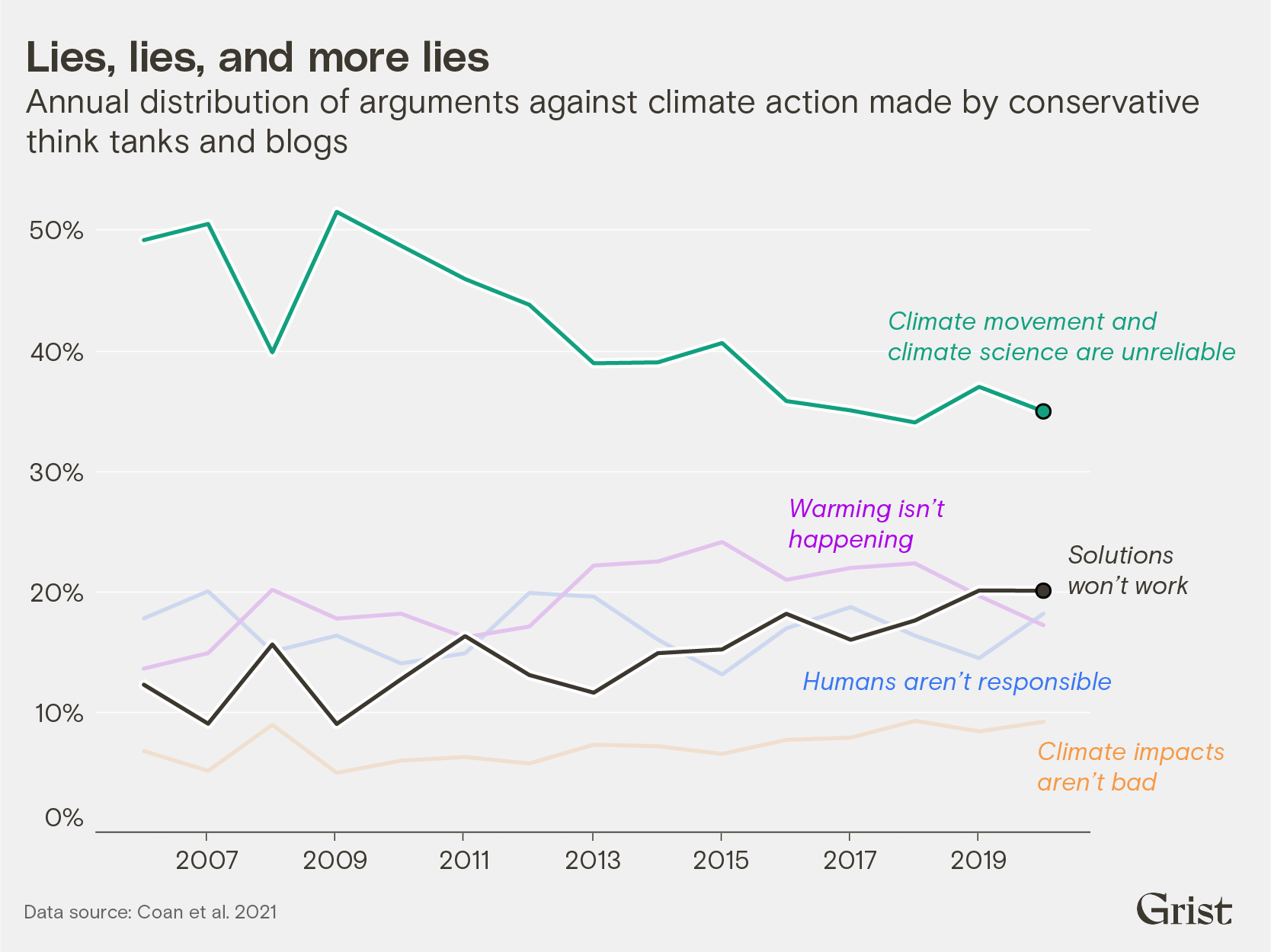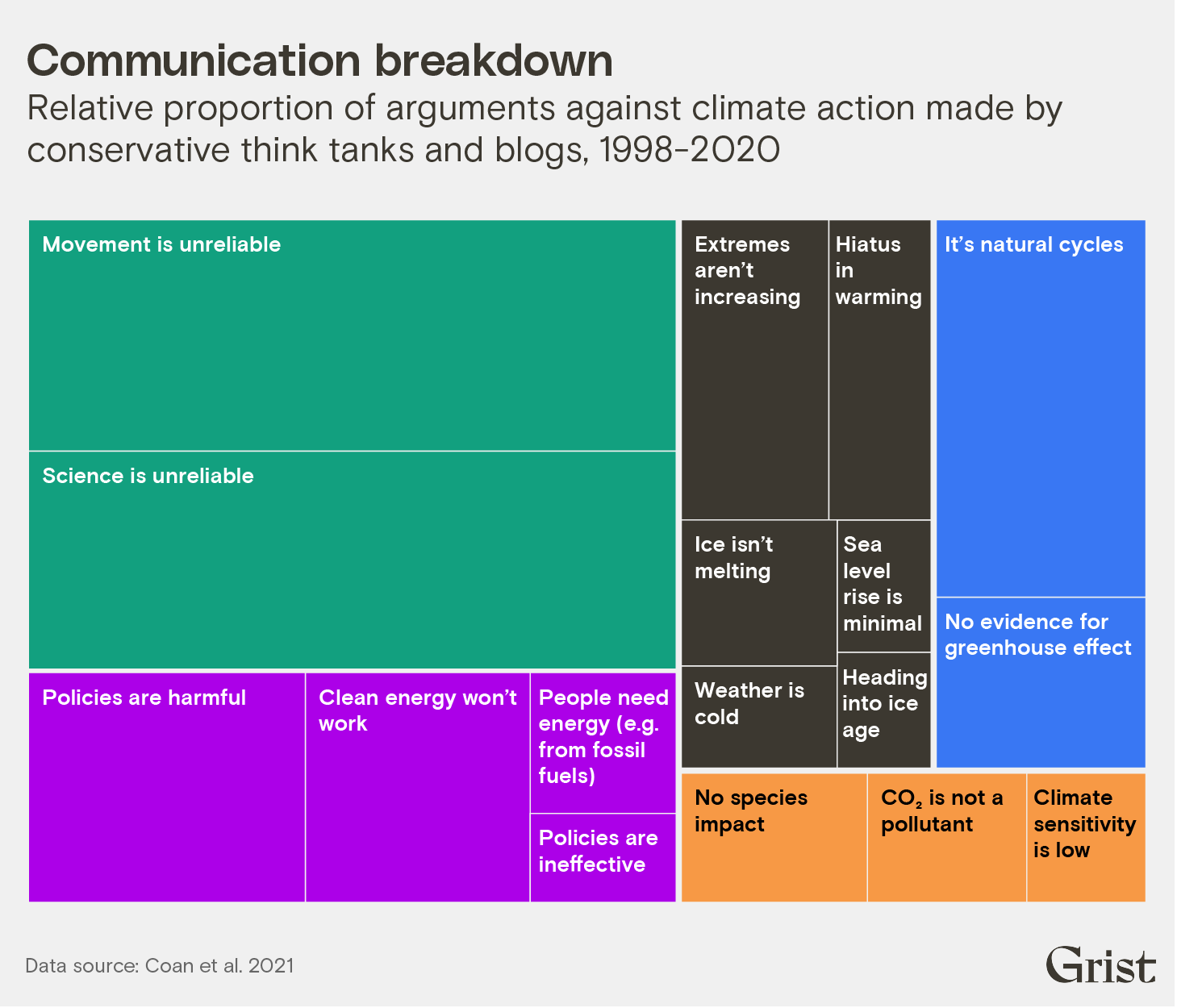Believe it or not, it’s nearly 2022 and some people still think we shouldn’t do anything about the climate crisis. Even though most Americans understand that carbon emissions are overheating the planet and want to take action to stop it, attacks on clean energy and policies to limit carbon emissions are on the rise.
In a study out this week in the journal Nature Scientific Reports, researchers found that outright denying the science is going out of fashion. Today, only about 10 percent of arguments from conservative think tanks in North America challenge the scientific consensus around global warming or question models and data. (For the record, 99.9 percent of scientists agree that human activity is heating up the planet.) Instead, the most common arguments are that scientists and climate advocates simply can’t be trusted, and that proposed solutions won’t work.

That came as a surprise to the researchers. Scientists get called “alarmists,” despite a history of underestimating the effects of an overheating planet. Politicians and the media are portrayed as biased, while environmentalists are painted as part of a “hysterical” climate “cult.”
“It kind of dismayed me, because I spent my career debunking the first three categories — ‘it’s not real, it’s not us, it’s not bad’ — and those were the lowest categories of misinformation,” said John Cook, a co-author of the study and a research fellow at the Climate Change Communication Research Hub at Monash University in Australia. “Instead, what they were doing was trying to undermine trust in climate science and attack the actual climate movement. And there’s not much research into how to counter that or understand it.”
Researchers found that attacks on “climate solutions” are also on the rise. People who want to delay action often argue that renewable energy can’t replace fossil fuels. They also say that climate policies will hurt working families, ruin the economy, and raise prices. Typically such arguments overlook how pollution from burning fossil fuels shortens lifespans and how climate-charged disasters like wildfires, flooding, and heat waves are already ruining people’s lives and costing billions. They tend to ignore estimates that the changing climate could cost the U.S. 10.5 percent of GDP by the end of the century.
“Climate solutions misinformation is really the future of climate misinformation,” Cook said. It has been the predominant argument from conservative think tanks since 2008 and recently became the second-most common point made on anti-climate blogs, beating out the increasingly unbelievable claim that the Earth isn’t warming.

For the study, researchers from the United Kingdom, Ireland, and Australia used machine learning to categorize arguments against taking climate action, tracking how they evolved over time. Using material from 33 prominent blogs and 20 think tanks, they analyzed more than 255,000 documents from 1998 to 2020, the majority of them from the United States.
It took Cook and his team about five years to create a machine learning model that was able to reliably detect real-life climate misinformation claims. “Misinformation is messy and doing content analysis is messy, because the real world is always a bit blurry,” Cook said. First, they developed a taxonomy to sort arguments into broad categories — say, “climate change isn’t bad” — narrower claims (“carbon dioxide is not a pollutant”) and even more specific points (“CO2 is food for plants!”). Then they fed common climate myths into the machine until it was able to recognize each one consistently out in the wild.
The study also tracked how arguments against taking action changed over time. In general, misinformation around solutions ramped up before international climate conferences or at times when Congress debated climate legislation, such as the American Clean Energy and Security Act in 2009. After the announcement of a big climate bill, conservative think tanks argue that the policy will take a toll on the economy, followed by another spike right before the bill goes up for vote.
That means there’s also “an air of predictability” around misinformation, Cook says. “If we’re proactive enough, we can get ahead of it and inoculate the public,” he said.
Last year, Cook released a free game that “vaccinates” people against fake news. A cartoon character called Cranky Uncle — representing conspiracy-prone uncles everywhere — uses his favorite techniques to teach you to become a science denier like him. In the process of learning how to create fake news, people learn how to spot logical fallacies and other techniques used to dismiss scientific evidence, like cherry-picking temperature data or citing fake experts. This approach, called “pre-bunking,” has been shown to be effective — playing a similar kind of game can reduce people’s susceptibility to misinformation for three months, one study found.
Cook believes Cranky Uncle-style games could also help counter arguments against climate solutions or attacks on the movement, too. “Pre-bunking is kind of a universal template,” he said.
This story was originally published by Grist with the headline Climate change deniers are over attacking the science. Now they attack the solutions. on Nov 18, 2021.
This post was originally published on Grist.